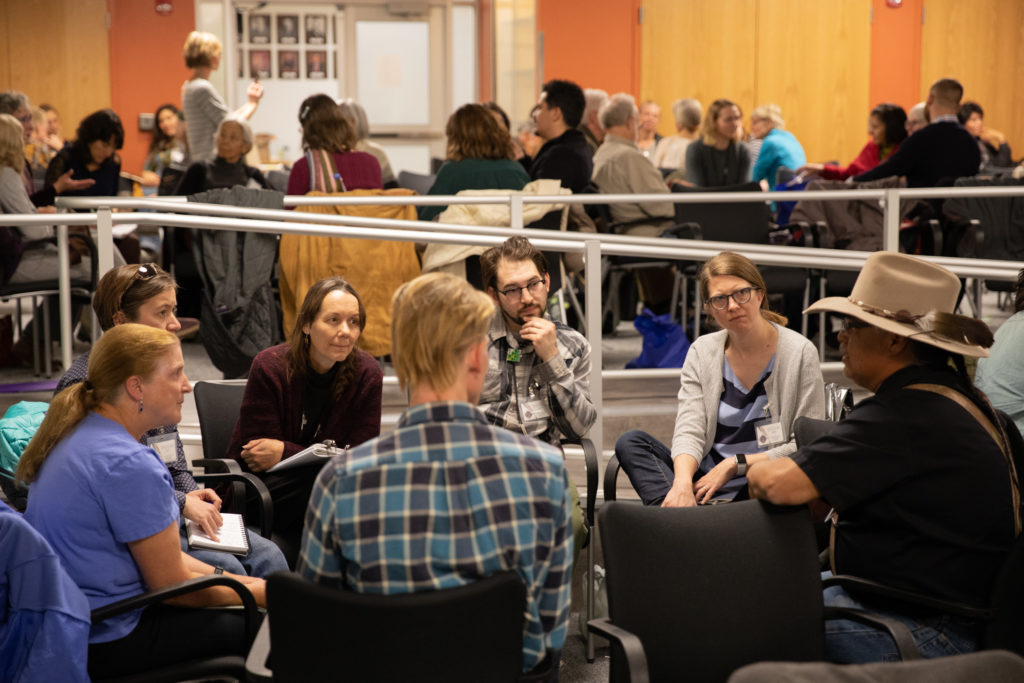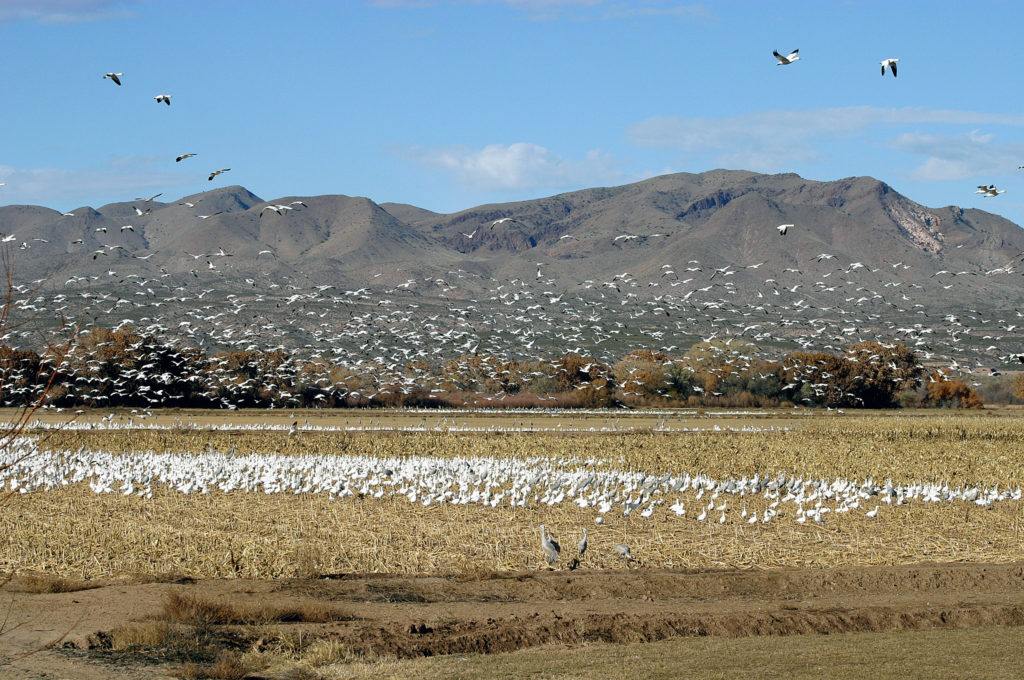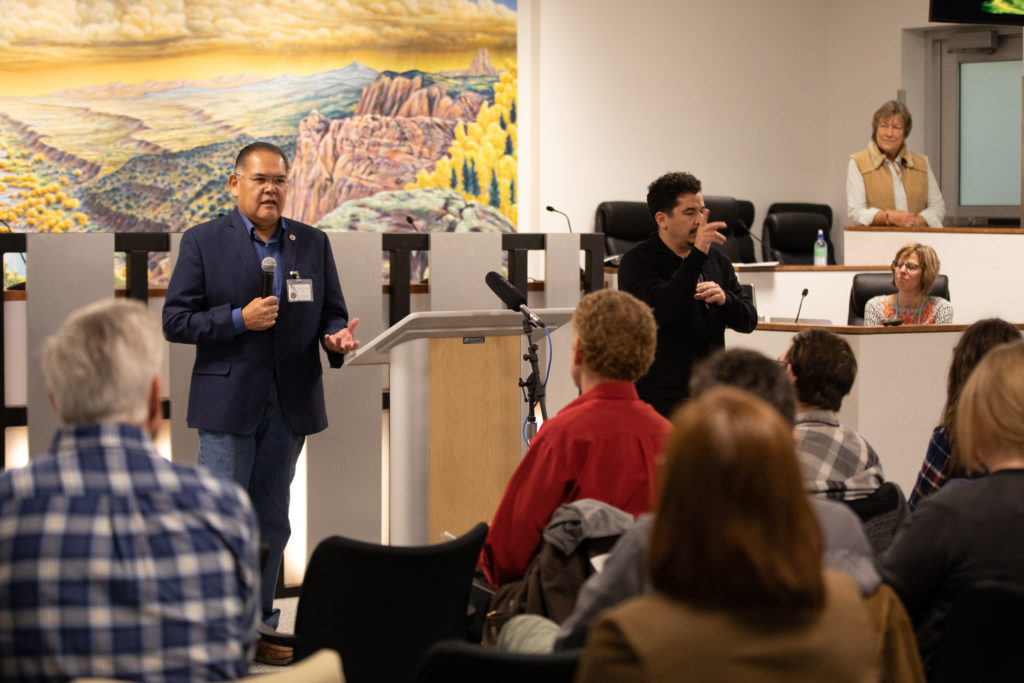As legislators look to policies to impact climate change, New Mexico is leading to address the climate crisis through agriculture policy. Following impactful soil health policy in California, in 2019, HB 204, The New Mexico Healthy Soil Act was signed into law, creating the New Mexico Healthy Soil Program, which is leading the way in protecting soil health through policy.
Climate change is a looming crisis and farmers and ranchers have a role to play in mitigating it, but they need support to transition to a new system. Protecting and building up healthy soils is a great way for farmers and ranchers to sequester carbon, store water, and put nutrients back into the soil.
The New Mexico Healthy Soil Working Group, a statewide grassroots advocacy network, authored the 2019 bill and brought together a large coalition in support. We were curious to learn about their bill and the process that they went through to get it passed. Here’s what they shared.

Community forum on Regenerative Agriculture Day, hosted by the NM Healthy Soil Working Group in partnership with the NM State Land Office. Photo credit: Esha Chiocchio
What is the goal of HB 204?
New Mexico’s Healthy Soil Program aims to promote and support farming and ranching systems and other forms of land management by increasing soil organic matter and aggregate stability, microbiology, and water retention of soil to improve the health, yield, and profitability of the soils of the state.

Sandhill cranes gleaning in agricultural fields. Photo credit: Tom Clark, NRCS NM.
What does HB 204 do?
HB 204 directs the New Mexico Department of Agriculture (NMDA) to establish and oversee a voluntary Healthy Soil Program which will provide incentives in the form of education, research, grants, and technical assistance to farmers, ranchers, and other land managers.
The program provides grants for projects that enhance soil health on working lands. In addition, it will measure baseline soil health by testing the organic matter, water infiltration rate, microbiology, aggregate stability of soils, soil cover, and analysis of phospholipids on behalf of the producers.
What makes this healthy soil bill successful in protecting New Mexico’s soil?
The NM Healthy Soil Act is focused on soil health principles, rather than prescribing specific practices. This approach means the law will not need continual amendments to include new practices as science and practice evolves.
Focusing on soil health principles presents a broadly accepted, adaptive, supportive, and thorough approach to stewardship. Empowering producers to make management decisions guided by these principles and based on their own observations takes each farm’s unique situation into account, acknowledges producers’ self-determination, and promotes deeper learning and lasting commitments.
The program is guided by five soil health principles:
- 1) keep soil covered;
- 2) minimize soil disturbance on cropland and minimize external inputs;
- 3) maximize biodiversity;
- 4) maintain living roots; and
- 5) integrate animals including grazing animals, birds, beneficial insects, and keystone species such as earthworms.
What was the approach in getting HB 204 passed?
Coalition and consensus building was at the heart of the short and successful campaign to pass the Healthy Soil Act. The Healthy Soil Working Group brought together a coalition of over 100 food and agriculture organizations, as well as environmental groups and dozens of farms and ranches. With this network behind it, the bill was introduced in January 2019, received bipartisan support in the House and unanimous backing in the Senate, and was signed into law by the governor on April 2, 2019.
We solidified support by focusing on the many ways healthy soils impact water availability and quality, ecosystems, farm economies, and revival of rural communities. Emphasis on the voluntary approach was vital as well.
Building trust with partners was also critical to the success of the bill. This came from adapting terminology as well as commitment and time dedicated to building consensus.

Governor Herrera of Tesuque Pueblo opens Regenerative Agriculture Day in Santa Fe, NM, February 2019. Photo credit: Esha Chiocchio
How was equity incorporated into HB 204?
New Mexico has a diverse farming and ranching community. To ensure equity, Native American tribes, acequias, and Land Grants are explicitly named as eligible entities to receive funding through the Healthy Soil Program. Projects in underserved communities, or serving veterans or young farmers, receive priority.
What are the next steps in protecting New Mexico’s soil?
In 2021, HB 89 was unanimously passed and signed into law. The bill added a new section to the Income Tax Act, enabling New Mexico residents who qualify for a state tax refund to voluntarily contribute all or part of their refund to the Healthy Soil Program.
The bill had bi-partisan sponsors and passed all committees with unanimous support, cleared the House floor unanimously, and received only one dissenting vote in the Senate. This exceptional amount of bipartisan support in the legislature built on two years of successful administration of the Healthy Soil Program by NMDA. It also reflects a growing understanding of the importance of soil stewardship for New Mexico in relation to drought resilience, water conservation, and climate change mitigation.
Promotion and outreach will be essential to inform the public of this new tax refund contribution option and generate much-needed funds for the Healthy Soil Program. It is also an opportunity to raise awareness about the importance of soil health for public health and the environment and engage civic society in supporting producers who practice soil stewardship.

